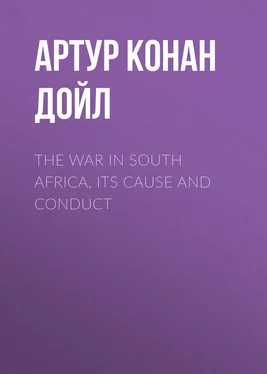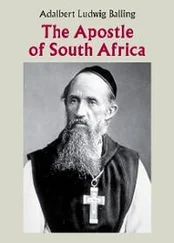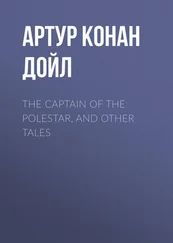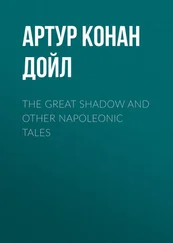Артур Дойл - The War in South Africa, Its Cause and Conduct
Здесь есть возможность читать онлайн «Артур Дойл - The War in South Africa, Its Cause and Conduct» — ознакомительный отрывок электронной книги совершенно бесплатно, а после прочтения отрывка купить полную версию. В некоторых случаях можно слушать аудио, скачать через торрент в формате fb2 и присутствует краткое содержание. Жанр: foreign_antique, foreign_prose, на английском языке. Описание произведения, (предисловие) а так же отзывы посетителей доступны на портале библиотеки ЛибКат.
- Название:The War in South Africa, Its Cause and Conduct
- Автор:
- Жанр:
- Год:неизвестен
- ISBN:нет данных
- Рейтинг книги:5 / 5. Голосов: 1
-
Избранное:Добавить в избранное
- Отзывы:
-
Ваша оценка:
- 100
- 1
- 2
- 3
- 4
- 5
The War in South Africa, Its Cause and Conduct: краткое содержание, описание и аннотация
Предлагаем к чтению аннотацию, описание, краткое содержание или предисловие (зависит от того, что написал сам автор книги «The War in South Africa, Its Cause and Conduct»). Если вы не нашли необходимую информацию о книге — напишите в комментариях, мы постараемся отыскать её.
The War in South Africa, Its Cause and Conduct — читать онлайн ознакомительный отрывок
Ниже представлен текст книги, разбитый по страницам. Система сохранения места последней прочитанной страницы, позволяет с удобством читать онлайн бесплатно книгу «The War in South Africa, Its Cause and Conduct», без необходимости каждый раз заново искать на чём Вы остановились. Поставьте закладку, и сможете в любой момент перейти на страницу, на которой закончили чтение.
Интервал:
Закладка:
The Imperial Government has always taken an honourable and philanthropic view of the rights of the native and the claim which he has to the protection of the law. We hold, and rightly, that British justice, if not blind, should at least be colour-blind. The view is irreproachable in theory and incontestable in argument, but it is apt to be irritating when urged by a Boston moralist or a London philanthropist upon men whose whole society has been built upon the assumption that the black is the inferior race. Such a people like to find the higher morality for themselves, not to have it imposed upon them by those who live under entirely different conditions.
The British Government in South Africa has always played the unpopular part of the friend and protector of the native servants. It was upon this very point that the first friction appeared between the old settlers and the new administration. A rising with bloodshed followed the arrest of a Dutch farmer who had maltreated his slave. It was suppressed, and five of the participants were hanged. This punishment was unduly severe and exceedingly injudicious. A brave race can forget the victims of the field of battle, but never those of the scaffold. The making of political martyrs is the last insanity of statesmanship. However, the thing was done, and it is typical of the enduring resentment which was left behind that when, after the Jameson Raid, it seemed that the leaders of that ill-fated venture might be hanged, the beam was actually brought from a farmhouse at Cookhouse Drift to Pretoria, that the Englishmen might die as the Dutchmen had died in 1816. Slagter's Nek marked the dividing of the ways between the British Government and the Africanders.
And the separation soon became more marked. With vicarious generosity, the English Government gave very lenient terms to the Kaffir tribes who in 1834 had raided the border farmers. And then, finally, in this same year there came the emancipation of the slaves throughout the British Empire, which fanned all smouldering discontents into an active flame.
It must be confessed that on this occasion the British philanthropist was willing to pay for what he thought was right. It was a noble national action, and one the morality of which was in advance of its time, that the British Parliament should vote the enormous sum of twenty million pounds to pay compensation to the slaveholders, and so to remove an evil with which the mother country had no immediate connection. It was as well that the thing should have been done when it was, for had we waited till the colonies affected had governments of their own it could never have been done by constitutional methods. With many a grumble the good British householder drew his purse from his fob, and paid for what he thought to be right. If any special grace attends the virtuous action which brings nothing but tribulation in this world, then we may hope for it over this emancipation. We spent our money, we ruined our West Indian colonies, and we started a disaffection in South Africa, the end of which we have not seen.
But the details of the measure were less honourable than the principle. It was carried out suddenly, so that the country had no time to adjust itself to the new conditions. Three million pounds were ear-marked for South Africa, which gives a price per slave of from 60 l. to 70 l. , a sum considerably below the current local rates. Finally, the compensation was made payable in London, so that the farmers sold their claims at reduced prices to middlemen. Indignation meetings were held in every little townlet and cattle-camp on the Karoo. The old Dutch spirit was up – the spirit of the men who cut the dykes. Rebellion was useless. But a vast untenanted land stretched to the north of them. The nomad life was congenial to them, and in their huge ox-drawn wagons – like those bullock-carts in which some of their old kinsmen came to Gaul – they had vehicles and homes and forts all in one. One by one they were loaded up, the huge teams were inspanned, the women were seated inside, the men with their long-barrelled guns walked alongside, and the great exodus was begun. Their herds and flocks accompanied the migration, and the children helped to round them in and drive them. One tattered little boy of ten cracked his sjambok whip behind the bullocks. He was a small item in that singular crowd, but he was of interest to us, for his name was Paul Stephanus Kruger.
It was a strange exodus, only comparable in modern times to the sallying forth of the Mormons from Nauvoo upon their search for the promised land of Utah. The country was known and sparsely settled as far north as the Orange River, but beyond there was a great region which had never been penetrated save by some daring hunter or adventurous pioneer. It chanced – if there be indeed such an element as chance in the graver affairs of man – that a Zulu conqueror had swept over this land and left it untenanted, save by the dwarf bushmen, the hideous aborigines, lowest of the human race. There were fine grazing and good soil for the emigrants. They travelled in small detached parties, but their total numbers were considerable, from six to ten thousand according to their historian, or nearly a quarter of the whole population of the colony. Some of the early bands perished miserably. A large number made a trysting-place at a high peak to the east of Bloemfontein, in what was lately the Orange Free State. One party of the emigrants was cut off by the formidable Matabeli, a branch of the great Zulu nation.
The final victory of the 'voortrekkers' cleared all the country between the Orange River and the Limpopo, the sites of what have been known as the Transvaal and the Orange Free State. In the meantime another body of the emigrants had descended into Natal, and had defeated Dingaan, the great Chief of the Zulus.
And now at the end of their great journey, after overcoming the difficulties of distance, of nature, and of savage enemies, the Boers saw at the end of their travels the very thing which they desired least – that which they had come so far to avoid – the flag of Great Britain. The Boers had occupied Natal from within, but England had previously done the same by sea, and a small colony of Englishmen had settled at Port Natal, now known as Durban. The home Government, however, had acted in a vacillating way, and it was only the conquest of Natal by the Boers which caused them to claim it as a British colony. At the same time they asserted the unwelcome doctrine that a British subject could not at will throw off his allegiance, and that, go where they might, the wandering farmers were still only the pioneers of British colonies. To emphasise the fact three companies of soldiers were sent in 1842 to what is now Durban – the usual Corporal's guard with which Great Britain starts a new empire. This handful of men was waylaid by the Boers and cut up, as their successors have been so often since. The survivors, however, fortified themselves, and held a defensive position – as also their successors have done so many times since – until reinforcements arrived and the farmers dispersed. Natal from this time onward became a British colony, and the majority of the Boers trekked north and east with bitter hearts to tell their wrongs to their brethren of the Orange Free State and of the Transvaal.
Had they any wrongs to tell? It is difficult to reach that height of philosophic detachment which enables the historian to deal absolutely impartially where his own country is a party to the quarrel. But at least we may allow that there is a case for our adversary. Our annexation of Natal had been by no means definite, and it was they and not we who first broke that bloodthirsty Zulu power which threw its shadow across the country. It was hard after such trials and such exploits to turn their back upon the fertile land which they had conquered, and to return to the bare pastures of the upland veldt. They carried out of Natal a heavy sense of injury, which has helped to poison our relations with them ever since. It was, in a way, a momentous episode, this little skirmish of soldiers and emigrants, for it was the heading off of the Boer from the sea and the confinement of his ambition to the land. Had it gone the other way, a new and possibly formidable flag would have been added to the maritime nations.
Читать дальшеИнтервал:
Закладка:
Похожие книги на «The War in South Africa, Its Cause and Conduct»
Представляем Вашему вниманию похожие книги на «The War in South Africa, Its Cause and Conduct» списком для выбора. Мы отобрали схожую по названию и смыслу литературу в надежде предоставить читателям больше вариантов отыскать новые, интересные, ещё непрочитанные произведения.
Обсуждение, отзывы о книге «The War in South Africa, Its Cause and Conduct» и просто собственные мнения читателей. Оставьте ваши комментарии, напишите, что Вы думаете о произведении, его смысле или главных героях. Укажите что конкретно понравилось, а что нет, и почему Вы так считаете.












